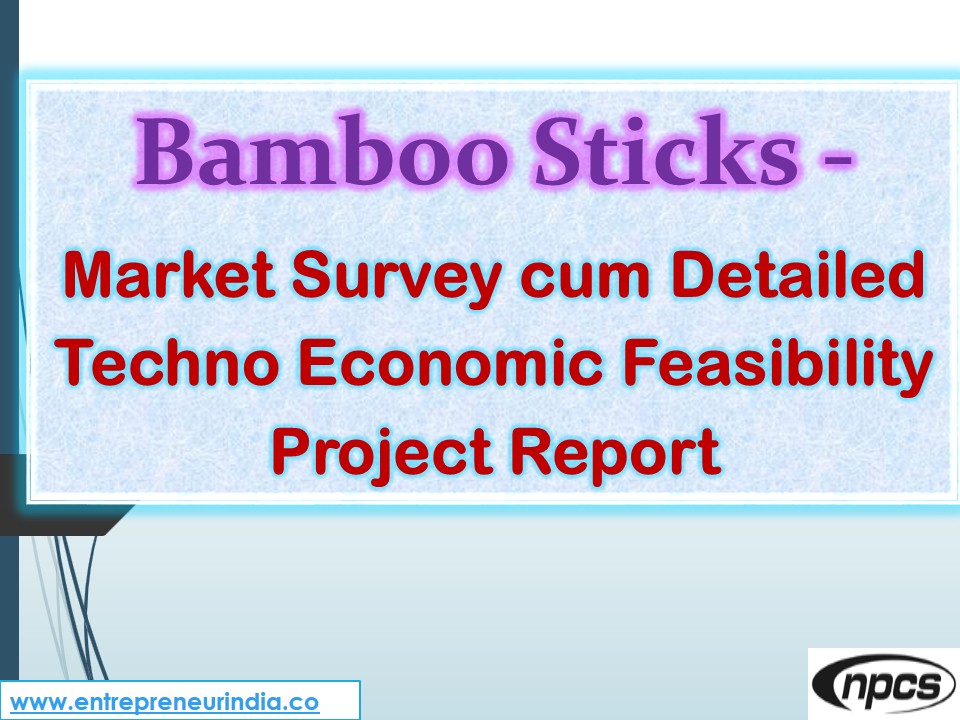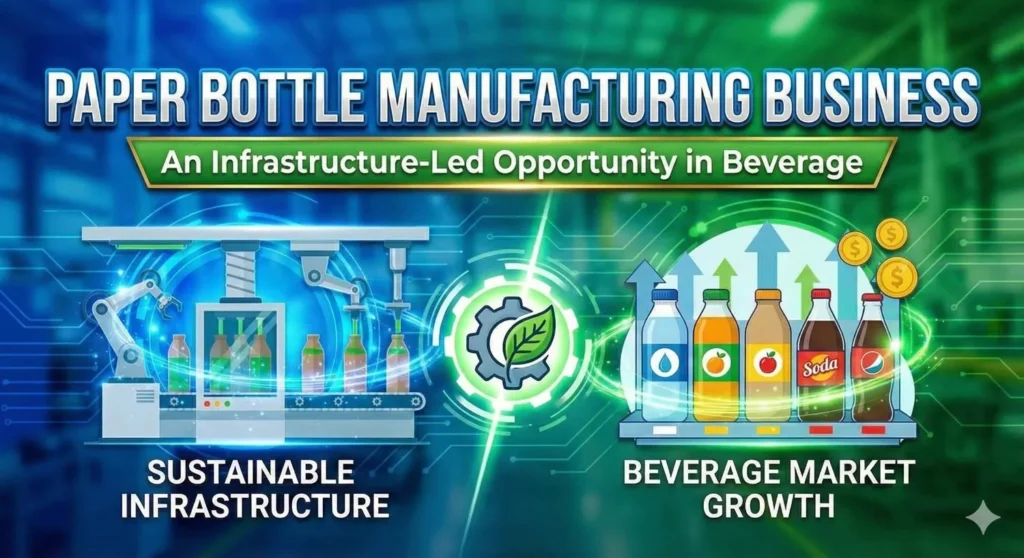
Starting a bamboo sticks manufacturing plant offers an excellent business opportunity in today’s eco-conscious and rapidly industrializing world. Bamboo, a fast-growing renewable resource, finds wide applications in various industries. From incense sticks to skewers and construction materials, the demand for bamboo products continues to rise. Consequently, entrepreneurs seeking a low-investment, high-return venture can benefit greatly from entering the bamboo sticks manufacturing sector.
This guide provides a complete overview of setting up a bamboo sticks manufacturing plant, covering raw materials, machinery, processes, market potential, and profitability factors.
Contents
Overview of Bamboo Sticks Manufacturing
Bamboo sticks manufacturing involves the processing of raw bamboo into slender, uniform sticks used for multiple purposes. Although incense sticks (agarbatti) production is the most popular use, bamboo sticks also serve in the food industry, arts and crafts, and agriculture.
See Also : Artificial Sand Manufacturing Plant
The production process is relatively simple, and raw materials are abundantly available in tropical and subtropical regions. Furthermore, with rising environmental concerns, bamboo is increasingly preferred over plastic alternatives, thus making this business even more lucrative.
Setting Up the Manufacturing Unit
To ensure smooth operations and maximize returns, you should carefully plan each phase of setting up the bamboo sticks manufacturing unit.
Raw Materials Required
First and foremost, selecting the right type of bamboo is essential. Common varieties used in India include Bambusa tulda and Dendrocalamus strictus. These types offer both flexibility and strength, which are ideal for stick making.
Besides bamboo culms, you will also need:
-
Water (for soaking and softening)
-
Polish or bleaching chemicals (for finishing)
-
Packing materials (poly bags, cartons, etc.)
Since bamboo is harvested in bulk, it is advisable to establish supplier contracts or cultivate your own plantation.
Space and Infrastructure
A standard bamboo sticks manufacturing plant requires about 1000 to 1500 sq. ft. of built-up area. The facility must include areas for:
-
Bamboo storage
-
Cutting and sizing
-
Stick-making machines
-
Drying and polishing
-
Packaging
Moreover, proper ventilation and water supply are necessary to maintain the quality of bamboo sticks and ensure worker safety.
Required Machinery
Choosing appropriate machinery significantly boosts productivity and stick uniformity. The following machines are commonly used:
-
Bamboo Cross Cutting Machine
-
Bamboo Slicing Machine
-
Stick Making Machine
-
Stick Sizing Machine
-
Polishing Machine
-
Drying Rack or Dryer
-
Manual or semi-automatic packaging machine
As a result of mechanization, labor requirements are reduced and production becomes faster. However, semi-automatic setups are still preferred by small-scale units to keep costs under control.
Manufacturing Process of Bamboo Sticks
The manufacturing of bamboo sticks involves a series of mechanical steps. Though it is a simple process, precision and cleanliness are critical.
1. Bamboo Selection and Cutting
Firstly, raw bamboo culms are selected based on diameter and quality. These are then cut into specific lengths using a cross-cutting machine.
2. Splitting and Slicing
Next, the bamboo pieces are split lengthwise and sliced into thin slivers. These slivers serve as the base material for making sticks.
3. Stick Forming
The bamboo slivers are then fed into stick-making machines, where they are shaped into sticks of uniform thickness and length.
4. Sizing and Polishing
Afterward, the sticks undergo sizing to ensure standard measurements. The sticks are polished and treated with bleaching agents if needed.
5. Drying and Packaging
Finally, the sticks are dried using sunlight or mechanical dryers before being packed into bundles or boxes for sale.
Throughout the process, quality control must be ensured to meet market standards.
Market Opportunities and Demand
Due to its versatility, bamboo sticks enjoy demand from various sectors. The incense stick industry remains the largest consumer, followed by food and beverage outlets using bamboo skewers. Additionally, handicraft makers and gardening businesses also rely on bamboo sticks.
Domestic Demand
In India, the demand for incense sticks is enormous and consistent. Since bamboo sticks form the base material for agarbattis, the requirement remains high year-round. Moreover, the Swachh Bharat Abhiyan and plastic ban policies have increased the popularity of eco-friendly alternatives like bamboo.
Export Potential
Bamboo sticks manufacturing offers great export potential, particularly to countries such as:
-
Indonesia
-
Vietnam
-
Thailand
-
Bangladesh
-
Nepal
Many of these countries import sticks for incense and skewer production. Therefore, with proper quality assurance and bulk supply, you can successfully tap into international markets.
Cost and Investment Analysis
Setting up a bamboo sticks manufacturing plant involves moderate investment, which varies based on the automation level. Below is a basic cost breakdown:
-
Machinery & Equipment: ?3 to ?5 lakhs
-
Raw Material (initial): ?1 lakh
-
Infrastructure Setup: ?2 lakhs
-
Working Capital: ?1.5 lakhs
-
Miscellaneous Expenses: ?50,000
Total Estimated Investment: ?8 to ?10 lakhs
The break-even point can be achieved within 6 to 12 months, depending on your production capacity and market access.
Licensing and Legal Requirements
Before starting operations, certain permissions and registrations must be obtained:
-
Udyam Registration (MSME)
-
Trade License from local authority
-
GST Registration
-
NOC from Pollution Control Board (if applicable)
-
Import Export Code (for exports)
Additionally, it is important to comply with labor laws and factory regulations to avoid future legal hurdles.
Sustainability and Environmental Benefits
Unlike plastic or wood, bamboo is highly sustainable due to its rapid growth and regenerative nature. Its cultivation requires minimal fertilizers and zero pesticides. Therefore, the environmental footprint of bamboo sticks manufacturing is significantly lower.
Furthermore, discarded bamboo waste can be reused to make particle boards or briquettes, making the process even more sustainable. Thus, not only is the business profitable, but it also supports green manufacturing practices.
Challenges in the Bamboo Sticks Industry
Despite the benefits, a few challenges should be considered:
-
Seasonal availability of quality bamboo
-
Machinery maintenance and replacement
-
Price fluctuations in raw material supply
-
Competition from low-cost imported sticks
Nevertheless, these challenges can be mitigated by forming co-operatives, investing in preventive maintenance, and sourcing bamboo from multiple regions.
Marketing and Distribution Strategies
After establishing production, strong marketing is key to business success. Some effective approaches include:
-
Collaborating with incense stick manufacturers
-
Selling through wholesalers and traders
-
Joining eCommerce platforms (Amazon, Flipkart)
-
Participating in industrial expos and trade fairs
-
Creating your own bamboo products brand
Branding your products with eco-friendly packaging and highlighting sustainability features can improve market visibility.
See Also : Wall Putty Manufacturing
Conclusion
Bamboo sticks manufacturing presents a promising and sustainable business opportunity for entrepreneurs. With increasing demand for eco-friendly products and support from the government for bamboo-based industries, this sector offers excellent growth prospects. By investing in the right machinery, maintaining product quality, and exploring both domestic and export markets, you can build a highly profitable enterprise.
Whether you are a first-time entrepreneur or a seasoned investor, bamboo sticks manufacturing can serve as a green, scalable, and income-generating business idea worth pursuing.





